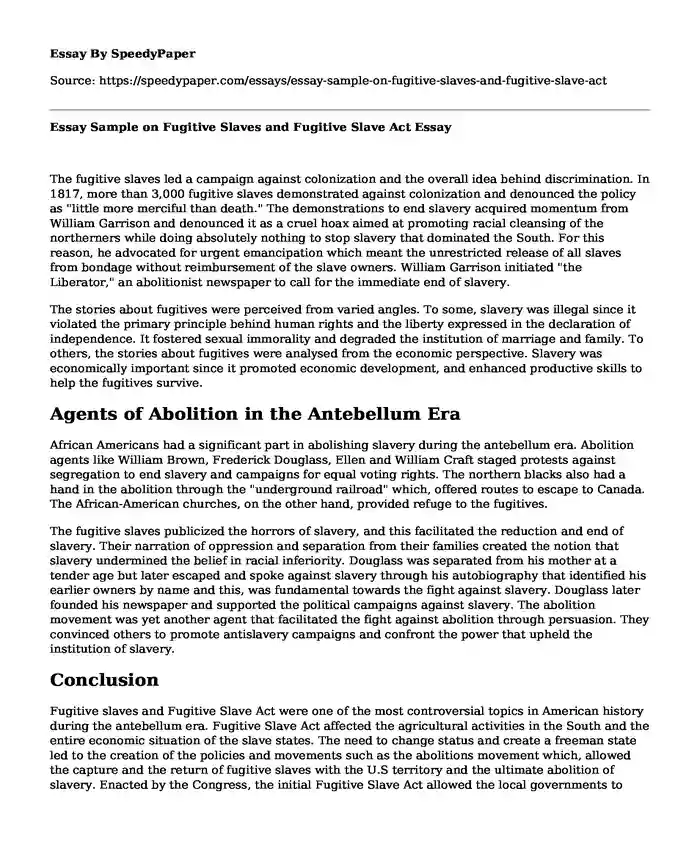
| Type of paper: | Essay |
| Categories: | Slavery American history |
| Pages: | 3 |
| Wordcount: | 613 words |
The fugitive slaves led a campaign against colonization and the overall idea behind discrimination. In 1817, more than 3,000 fugitive slaves demonstrated against colonization and denounced the policy as "little more merciful than death." The demonstrations to end slavery acquired momentum from William Garrison and denounced it as a cruel hoax aimed at promoting racial cleansing of the northerners while doing absolutely nothing to stop slavery that dominated the South. For this reason, he advocated for urgent emancipation which meant the unrestricted release of all slaves from bondage without reimbursement of the slave owners. William Garrison initiated "the Liberator," an abolitionist newspaper to call for the immediate end of slavery.
The stories about fugitives were perceived from varied angles. To some, slavery was illegal since it violated the primary principle behind human rights and the liberty expressed in the declaration of independence. It fostered sexual immorality and degraded the institution of marriage and family. To others, the stories about fugitives were analysed from the economic perspective. Slavery was economically important since it promoted economic development, and enhanced productive skills to help the fugitives survive.
Agents of Abolition in the Antebellum Era
African Americans had a significant part in abolishing slavery during the antebellum era. Abolition agents like William Brown, Frederick Douglass, Ellen and William Craft staged protests against segregation to end slavery and campaigns for equal voting rights. The northern blacks also had a hand in the abolition through the "underground railroad" which, offered routes to escape to Canada. The African-American churches, on the other hand, provided refuge to the fugitives.
The fugitive slaves publicized the horrors of slavery, and this facilitated the reduction and end of slavery. Their narration of oppression and separation from their families created the notion that slavery undermined the belief in racial inferiority. Douglass was separated from his mother at a tender age but later escaped and spoke against slavery through his autobiography that identified his earlier owners by name and this, was fundamental towards the fight against slavery. Douglass later founded his newspaper and supported the political campaigns against slavery. The abolition movement was yet another agent that facilitated the fight against abolition through persuasion. They convinced others to promote antislavery campaigns and confront the power that upheld the institution of slavery.
Conclusion
Fugitive slaves and Fugitive Slave Act were one of the most controversial topics in American history during the antebellum era. Fugitive Slave Act affected the agricultural activities in the South and the entire economic situation of the slave states. The need to change status and create a freeman state led to the creation of the policies and movements such as the abolitions movement which, allowed the capture and the return of fugitive slaves with the U.S territory and the ultimate abolition of slavery. Enacted by the Congress, the initial Fugitive Slave Act allowed the local governments to capture and return the fugitives to their owners and punish those that facilitated their escape. In the later years, the fugitive slaves led campaigns against colonization which was an initiative to try end segregation and slavery. This, however, did not work since opposition by the African Americans faced it. Demonstrations to end slavery acquired momentum from William Garrison who denounced the institution of slavery. In response to political and economic defense to slavery, the abolitionist movement used persuasion strategy to convince others to join hands in the fight against slavery.
Bibliography
"Anti-Slavery Meetings." Liberator 1, no. 13 (March 26, 1831): 50. American Antiquarian Society (AAS) Historical Periodicals Collection: Series 2, EBSCOhost (accessed April 24, 2018).
BRIEF NOTICES OF THE PROGRESS OF THE CAUSE OF ABOLITION IN THE UNITED STATES." Slavery in America: With Notices of the Present State of Slavery & the Slave Trade th...
Cite this page
Essay Sample on Fugitive Slaves and Fugitive Slave Act. (2022, May 22). Retrieved from https://speedypaper.com/essays/essay-sample-on-fugitive-slaves-and-fugitive-slave-act
Request Removal
If you are the original author of this essay and no longer wish to have it published on the SpeedyPaper website, please click below to request its removal:
- My Severe Academic Anxiety, Essay Sample
- Practicum Essay Sample
- Hospitality in Hongqiao NECC - Free Example of Literature Review
- Free Essay Analyzing Peers' Responses to the Article about Smartphone Location Data
- Where Should the Line Be Drawn Between Religious Observances and Public Education? Free Essay
- IBM in the United Kingdom and South Korea. Essay Example
- Free Essay on Screening for Thyroid Disease
Popular categories




